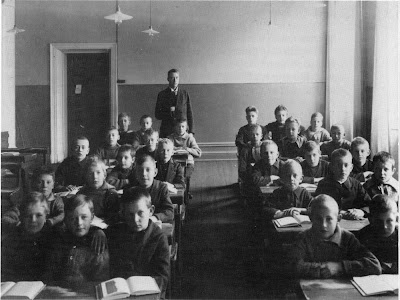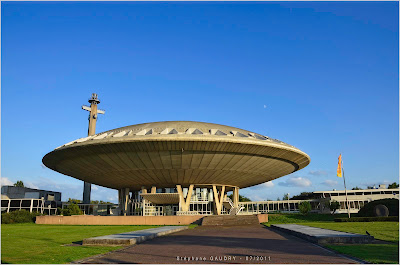'You can have it in any colour you like, so long as it's black' -
Henry Ford on the Model T Ford Motorcar.
Henry Ford built motor vehicles. He was very good at it. The cars were identical, and due to the economy of scale and the industrial process he devised, they were affordable for many, but still made a sizeable profit for Ford's company. His large scale industrial model rationalised resources, processed in batches, maximised the labour of his work force and minimised errors and guesswork. The result was the Model T Ford - a car that was driven by a diverse population, but each one looked exactly the same. This idea, when applied to other production processes, was known as Fordism, and it's now a byword for conformity and massification.
What about education? Ask anyone. We live in a diverse world. We are all unique individuals. Each of us has his or her own specific abilities and talents, preferences, desires and aspirations. These should be nurtured and encouraged, especially during our formative years. And yet many schools are based on the Fordist principles of conformity and massification. State funded education, said Nietzsche, is often mediocre for the same reasons that cooking in large kitchens is poor. Even with the best teachers and the highest aspirations, state funded education is still about lack of attention to detail, and a push to serve up a 'one size fits all' education. Children are required to perform according to the expectations of the school system, teachers, parents, society. It doesn't start with the mind. Insidiously, this indoctrination starts even before they arrive at school, through the way children are required to dress. Children in British schools are all expected to attend school dressed exactly the same, in the dreaded school uniform. The school coerces uniform behaviour through the symbolic act of uniform wearing. This often creates more problems than it addresses. School uniforms place an inordinate strain on the finances of many families who have to purchase the school uniform. Again and again. Throughout a child's formal education. I should know, having put three of my own kids through school, with new purchases required year in year out, to take into consideration; child growth, normal wear and tear and impromptu muddy football matches.
Another conformity device is the school bell. When it rings, the entire population of the school moves
en masse to another location to start another activity. The school is ruled by that audio signal. When the bell sounds at 1300 hours, you had better be hungry, because it's lunchtime! No running in the corridors! No loitering outside the science lab! Do you have a hall pass? Clearly, there are logistical issues to consider if we are to safely and effectively manage a volatile school population of over 1000 young people, but surely there are less militaristic ways to operate? When will we see schools acting less like prisons or military bases, and more like places where learning can actually be enjoyed?
Lessons are all conducted the same way, at the same pace (we have a lot to get through today...), and for those who are not quick enough it can be a regular nightmare. To address this problem teachers have to place children into 'sets' or 'streams' and teach souped up or dumbed down versions of each lesson to cope with the bright and less bright students. That's because schools insist on batch processing kids on the basis of their age and not their ability. Just another example of the Fordist principles schools are based on.
Standardised testing is yet another outcome of the conformity doctrine. Schools are meant to be places where children can gain education for the whole person, preparation for life. And yet standardised testing, in all its forms, is designed to capture a narrow, quantifiable impression of children's abilities. More often than not, it is a memory test, a snapshot of what they know there and then. Teaching to the test is a symptom of that doctrine. It's a way of ensuring that a school's achievement record is kept within the parameters of standards demanded by the funding body. It's where hard pressed and stressed teachers simply cover what is expected to come up in the exams. It's like teaching students to paint one picture over and over again, at the expense of learning the art of painting.
We are all different and have different interests, but somehow, school has succeeded in compartmentalising these interests into subjects, and this militates against holistic understanding of the world. How will children know that science and art have many connections, or that music and physics have a lot on common, if the subjects are taught differently, at different times and in vastly different environments? How will children express their individuality and creativity, if they are all expected to produce exactly the same products to 'prove' their learning, in identical formats, at precisely the same time each year?
It is clear that schools should be founded on diversity not on conformity. Yet to achieve this involves not only a strong consideration of the development of individuals and their specific abilities, but also on the need for each school to create its own distinct identity within its community. How can this be encouraged and supported?
Firstly, schools need good leadership, and each school leader needs to understand that school is only the beginning of the journey of lifelong learning. Get it wrong in school, and young people can be turned off from the joy of learning for a life time. Get it right, and children grow into informed, responsible adults whose innate curiosity and creativity are perpetuated for a life time. School leaders who understand this will do all they can to ensure that the school environment nurtures curiosity and transforms it into enquiry based learning of the highest order. Head teachers and principals who embrace the ethos of diversity will encourage their teams to provide opportunities for children to be creative, whatever the subject, wherever they are.
Secondly, educational systems need to change. Once and for all, we need to reject the standardised testing and 'terminal' assessment approaches to measuring children's knowledge, and instead concentrate on developing fair and appropriate testing that is continuous, ability specific and personalised. I wrote previously about some alternative assessment approaches in a blog entitled
Fair Measures some time ago. Let's stop branding children as failures during their formative years, and instead celebrate their successes against their own previous attainment levels.
Thirdly, we need to celebrate diversity in all its forms. Every child has something to offer, a unique capability, a special contribution they can bring. As psychologist
Carl Rogers once argued, all children should be unconditionally accepted with positive regard. Children need to know that they are valued for who they are, not just for what they do, and that they are accepted into the community of learning. They need to know that school is just the start of their long journey to discovery, and that failure is just another way of learning how to get it right in the end. Teaching them tenacity, patience, the ability to apply creative solutions to problems and positive regard for their peers is infinitely more rewarding than teaching them multiplication tables.
Rant over. What are your views?
Photo from
Wikimedia Commons

Diversity or conformity? by
Steve Wheeler is licensed under a
Creative Commons Attribution-NonCommercial-ShareAlike 3.0 Unported License.






